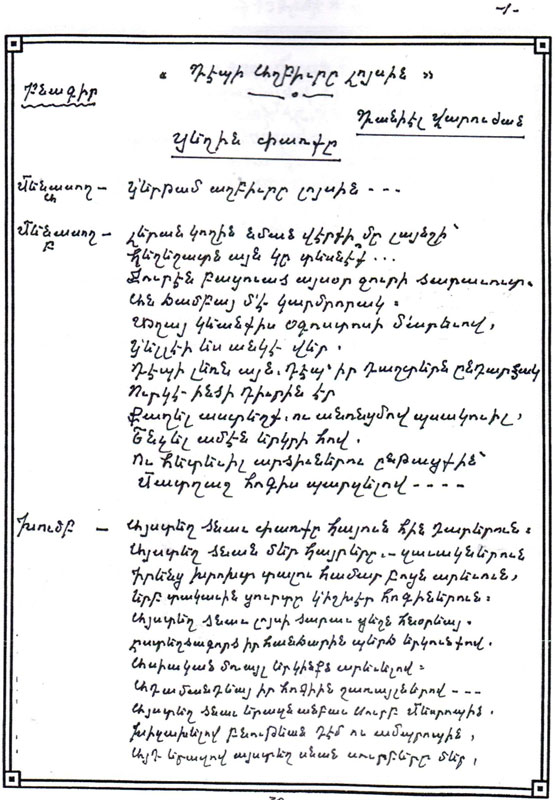ԶԱՒԱԿԻ ՄԱՍԻՆ
Հատուած՝ Ճպրան Խալիլ Ճպրանի Մարգարէն—էն
Թարգմ. Վահէ—Վահեանի
Ծնունդները ձեր չեն ձեր զաւակներն,
այլ՝ տղաքն անոնք եւ աղջիկներն են այն կարօտին զոր
Կեանքը կը տածէ ինքնիրեն հանդէպ։
Կու գան ձեր մէջէն, սակայն ոչ ձեզմէ։
Թէեւ ձեզի հետ՝ բայց չեն պատկանիր անոնք ձեր անձին։
Կրնաք տալ իրենց սէր ու գուրգուրանք,
Բայց ոչ մտածում,
Զի ունին անոնք իրենց խոհն ուրոյն։
Կրնաք տալ դուք տուն անոնց մարմինին,
Բայց ոչ հոգիին,
Զի կը բնակին հոգիներն անոնց՝
Տունին մէջ վաղուան, զոր այցելել դուք
չէք կրնար նոյնիսկ ձեր երազներով։
Կրնաք ջանալ որ նմանիք անոնց,
Բայց զանոնք ձեզի դարձնել նման՝ մի ձգտիք երբեք,
Քանզի չ՛ընթանար կեանքը դէպի ետ, ու ոչ ալ երկար կ՛ուզէ յամենալ ան երէկին մօտ։
Աղեղներ էք դուք, ուրկէ կ՛արձակուին ծնունդները ձեր՝ շնչող նետի պէս։
Ու նետաձիգն ինք, անսահմանութեան շաւիղին վրայ,
կը տեսնէ թիրախն իր նպատակին
ու կը ճկէ ձեզ Իր հզօրութեամբ,
որ նետը սուրայ եւ հասնի կէտին։
Թող նետաձիգին ձեռքերուն մէջ ձեր
ճկումը բերէ խնդութիւն միայն,
Վասնզի, ինչպէս որ կը սիրէ Ինք Նետը սլացող,
կը սիրէ նոյնպէս աղեղն ալ կայուն։
On Children
Kahlil Gibran
Your children are not your children.
They are the sons and daughters of Life's longing for itself.
They come through you but not from you,
And though they are with you yet they belong not to you.
You may give them your love but not your thoughts,
For they have their own thoughts.
You may house their bodies but not their souls,
For their souls dwell in the house of tomorrow,
which you cannot visit, not even in your dreams.
You may strive to be like them,
but seek not to make them like you.
For life goes not backward nor tarries with yesterday.
You are the bows from which your children
as living arrows are sent forth.
The archer sees the mark upon the path of the infinite,
and He bends you with His might
that His arrows may go swift and far.
Let our bending in the archer's hand be for gladness;
For even as He loves the arrow that flies,
so He loves also the bow that is stable.










